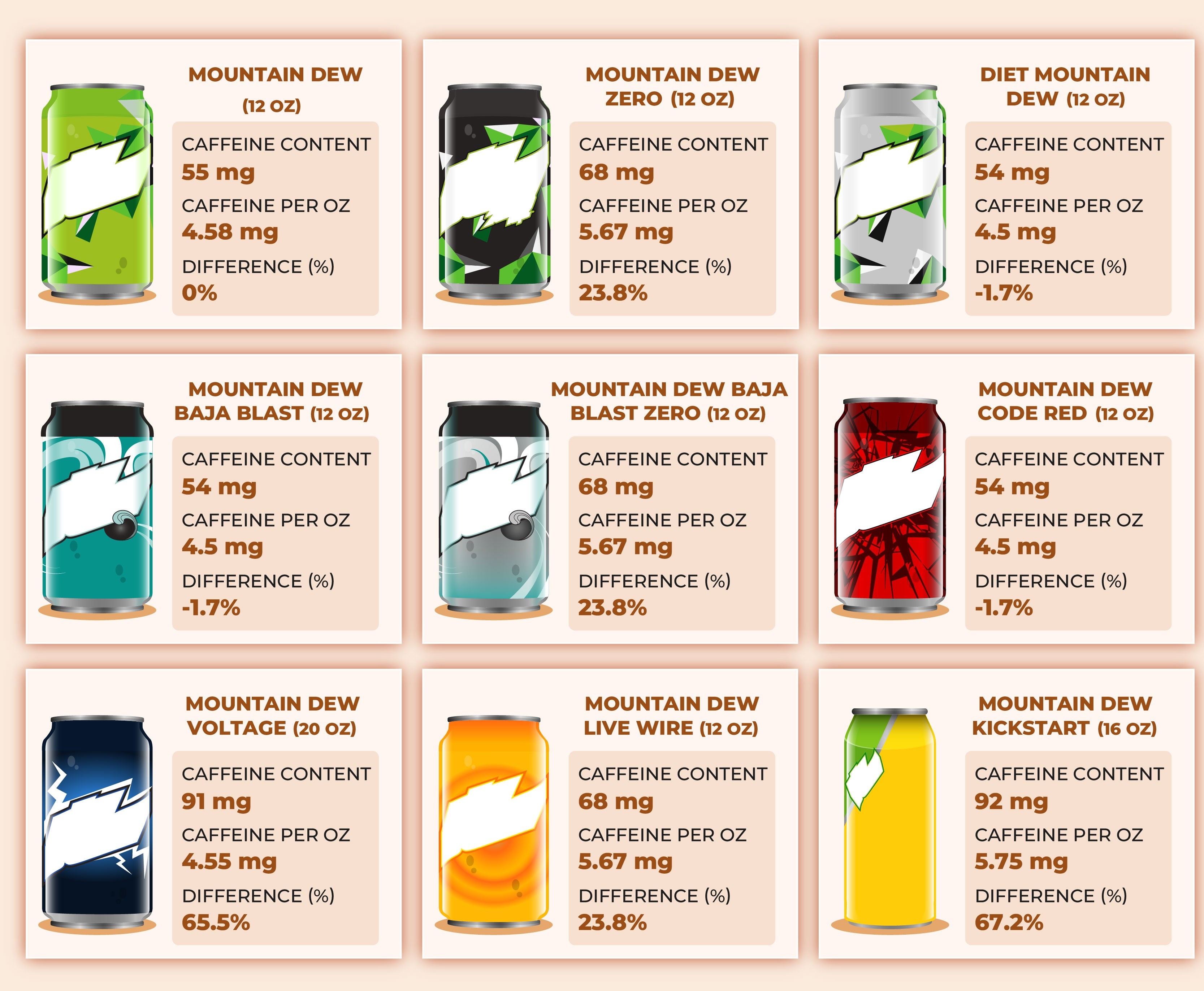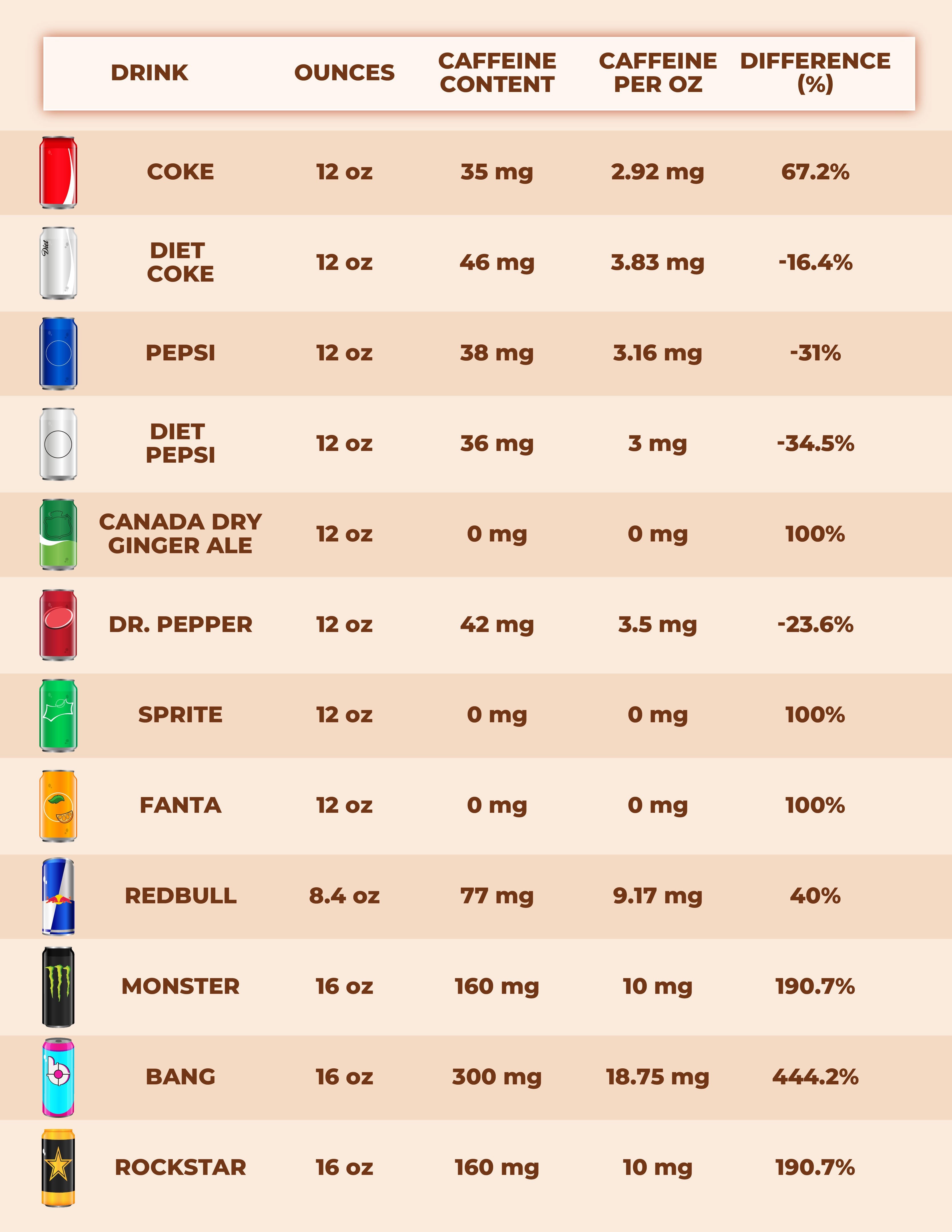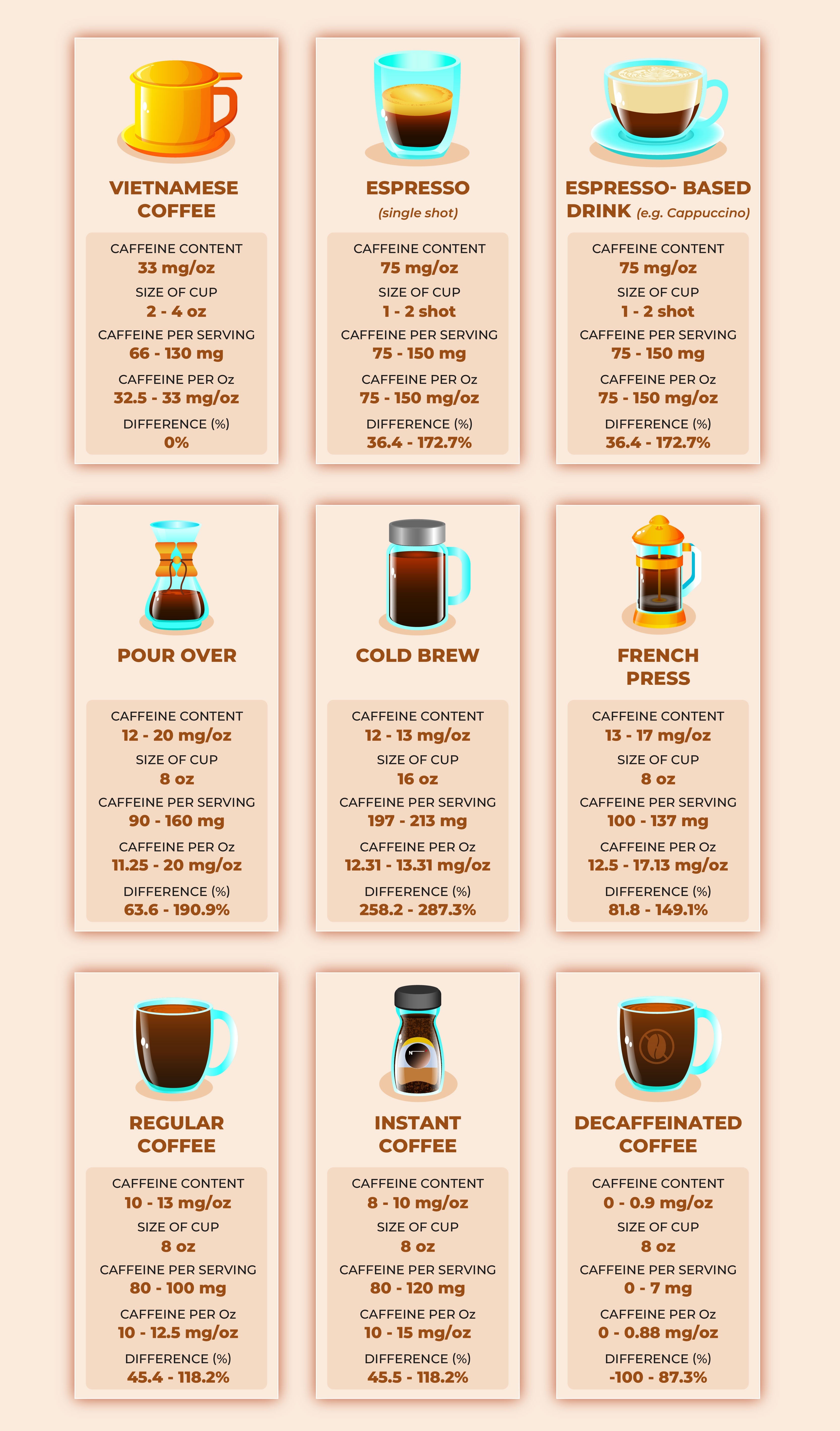Mountain Dew Caffeine Content: Understanding the Buzz. Curious about the caffeine levels in your favorite Mountain Dew flavors and how they compare to other beverages? HOW.EDU.VN provides expert analysis to help you make informed choices. Discover the facts about Mountain Dew’s stimulating effects, potential health implications, and safer alternatives. Explore caffeine content, energy drinks, and informed consumption.
1. Comparing Caffeine Content in Mountain Dew Drinks
Mountain Dew is a popular soda known for its unique citrus flavor and energizing kick. But how much caffeine does it really contain? The caffeine content in Mountain Dew varies depending on the specific type and serving size. Understanding these differences can help you manage your caffeine intake effectively.
Here’s a detailed breakdown of the caffeine levels in various Mountain Dew drinks:
| Mountain Dew Drink | Caffeine Content (per 12 oz can) |
|---|---|
| Regular Mountain Dew | 54 mg |
| Diet Mountain Dew | 54 mg |
| Mountain Dew Code Red | 54 mg |
| Mountain Dew Baja Blast | 54 mg |
| Mountain Dew Voltage | 69 mg |
| Mountain Dew White Out | 68 mg |
| Mountain Dew Kickstart | 68-92 mg (depending on flavor) |
| Mountain Dew Game Fuel | 90 mg |
| Mountain Dew Zero Sugar | 54 mg |
| Mountain Dew Major Melon | 54 mg |
| Mountain Dew Spark | 68 mg |
| Mountain Dew Dark Berry Bash | 68 mg |
| Mountain Dew Overdrive | 71 mg |



This table provides a comprehensive overview, but it’s essential to check the label on your specific Mountain Dew product, as caffeine levels can be subject to change. Understanding these figures allows consumers to make informed decisions about their caffeine consumption.
2. Mountain Dew vs. Other Energy Drinks: A Caffeine Showdown
When comparing Mountain Dew to other energy drinks, it’s clear that caffeine levels can vary significantly. While Mountain Dew provides a moderate caffeine boost, many energy drinks pack a much stronger punch. Understanding these differences is crucial for those who monitor their caffeine intake.
| Beverage | Caffeine Content (per 12 oz serving) |
|---|---|
| Mountain Dew | 54-92 mg (depending on flavor) |
| Coca-Cola | 34 mg |
| Pepsi | 38 mg |
| Red Bull | 111 mg |
| Monster Energy | 120 mg |
| Rockstar Energy | 160 mg |
| Starbucks Doubleshot Energy | 110-135 mg |
As you can see, some energy drinks contain significantly more caffeine than Mountain Dew. This information is essential for individuals who are sensitive to caffeine or have specific health conditions. Always check labels and be aware of the caffeine content to avoid overconsumption.
3. Caffeine Content: Mountain Dew vs. Coffee
Coffee is renowned for its high caffeine content, but how does Mountain Dew compare? While Mountain Dew provides a noticeable energy boost, coffee generally contains more caffeine per serving. Understanding these differences can help you choose the beverage that best suits your energy needs.
While a 12 oz can of regular Mountain Dew has approximately 54 mg of caffeine, an average 8 oz cup of coffee contains between 80 and 100 mg of caffeine. This means that coffee typically provides a stronger caffeine kick than Mountain Dew.
Caffeine Content of Various Coffee Preparations
| Coffee Type | Caffeine Content (per 8 oz serving) |
|---|---|
| Brewed Coffee | 80-100 mg |
| Espresso | 63 mg (per 1 oz shot) |
| Instant Coffee | 30-90 mg |
| Decaf Coffee | 2-12 mg |
For those seeking a significant energy boost, coffee may be the preferred choice. However, Mountain Dew can be a suitable alternative for individuals who prefer a sweeter, less intense caffeinated beverage.
4. Potential Risks and Side Effects of Caffeine Overconsumption
While caffeine can provide numerous benefits, excessive consumption can lead to several adverse effects. It’s crucial to understand the risks associated with high caffeine intake to maintain your health and well-being.
Most healthy adults can safely consume up to 400 milligrams of caffeine daily. However, exceeding this limit can result in:
- Insomnia
- Anxiety
- Increased heart rate
- Upset stomach
- Headaches
- Chest pain
- Heart palpitations
In extreme cases, overconsumption of caffeine can lead to more severe medical issues, including confusion, hallucinations, difficulty breathing, and uncontrollable movements. If you experience any of these symptoms, seek immediate medical attention.
It’s also important to consider individual tolerance levels, as age, gender, and underlying medical conditions can influence how caffeine affects you. Moderation and awareness are key to enjoying caffeine safely.
5. Deciphering Caffeine-Free Mountain Dew Options
For those looking to enjoy the taste of Mountain Dew without the caffeine, there are caffeine-free alternatives available. These options can be a great way to satisfy your craving without the stimulating effects of caffeine.
Caffeine-Free Mountain Dew Options:
- Caffeine-Free Diet Mountain Dew: This version provides the classic Mountain Dew flavor without any caffeine. However, its availability may be limited to certain regions.
- Other Caffeine-Free Sodas: Consider other caffeine-free sodas as alternatives, such as Sprite or 7-Up, which offer a similar refreshing taste.
It’s important to note that while these options eliminate caffeine, they may still contain high levels of sugar and artificial additives. Always read the label to make informed choices about your consumption.
6. Navigating the Daily Limits: How Much Mountain Dew is Too Much?
Moderation is key when it comes to consuming Mountain Dew. While it can be a tasty treat, excessive intake can lead to various health issues due to its high sugar and caffeine content.
According to the American Heart Association, women should consume no more than 25 grams of added sugar daily, and men should aim for under 36 grams. A 12 oz can of Mountain Dew contains approximately 46 grams of sugar, significantly exceeding these recommendations.
Potential Health Issues from Overconsumption:
- Diabetes
- Obesity
- Dental problems
- Heart disease
- Fatty liver disease
To minimize these risks, it’s best to limit your Mountain Dew consumption. Consider opting for smaller serving sizes or choosing lower-sugar alternatives.
7. Pregnancy and Mountain Dew: What Expectant Mothers Need to Know
During pregnancy, it’s crucial to be mindful of your caffeine intake. Experts recommend that pregnant women limit their daily caffeine consumption to under 200 mg to protect the health of both mother and baby.
Drinking more than 200 mg of caffeine daily during pregnancy can increase the risk of:
- Miscarriage
- Birth defects
- Premature labor
- Reduced fertility
Mountain Dew also contains high levels of sugar and artificial additives, which can pose additional risks during pregnancy. While an occasional Mountain Dew may be acceptable, it should not become a daily habit. Expectant mothers should prioritize healthier beverage options, such as water, herbal teas, and natural fruit juices.
8. Understanding the Dangers of Mixing Mountain Dew and Alcohol
Mixing Mountain Dew and alcohol can have serious consequences due to the combined effects of sugar, caffeine, and alcohol. This combination can mask the intoxicating effects of alcohol, leading to overconsumption and alcohol poisoning.
Both sugar and caffeine can interact with alcohol and reduce your perception of how intoxicated you are. As a result, you may drink more alcohol than you realize, increasing your risk of accidents, injuries, and other alcohol-related problems.
Mixing alcohol and Mountain Dew can also contribute to dehydration and cause a more severe hangover. It’s best to avoid this combination altogether and consume alcohol responsibly.
9. Identifying and Addressing Caffeine Addiction
Caffeine addiction is a real concern for regular consumers of caffeinated beverages like Mountain Dew. Because caffeine is a stimulant, it can activate the reward centers in your brain, leading to physical dependence.
Symptoms of Caffeine Addiction:
- An inability to reduce or control caffeine consumption
- Withdrawal symptoms, such as headaches, depression, and anxiety
- Severe cravings
If you experience these symptoms, it may be time to reevaluate your caffeine intake. Gradually reducing your consumption can help minimize withdrawal symptoms and break the cycle of addiction. Consider consulting with a healthcare professional for personalized guidance.
10. Exploring the History and Evolution of Mountain Dew
Mountain Dew has a rich history dating back to the 1940s when it was initially created as a mixer for whiskey. The name “Mountain Dew” was a slang term for moonshine, reflecting its original purpose.
Over the years, Mountain Dew has evolved from a regional product to a global phenomenon, with numerous flavors and variations introduced to cater to different tastes. Today, it remains one of the most popular sodas in the world, known for its bold flavor and energizing effects.
Despite its popularity, it’s important to consume Mountain Dew in moderation due to its high sugar and caffeine content. Understanding its history can provide a deeper appreciation for this iconic beverage while promoting responsible consumption habits.
11. Expert Opinions on Caffeine Consumption and Health
Health experts worldwide provide valuable insights into caffeine consumption and its impact on overall health. Understanding these perspectives can help you make informed decisions about your caffeine intake and adopt healthier lifestyle habits.
According to the Mayo Clinic, up to 400 milligrams of caffeine a day appears to be safe for most healthy adults. However, individual responses to caffeine can vary significantly. Factors such as body weight, medication use, and sensitivity to stimulants can all influence how caffeine affects you.
Experts at the American Heart Association emphasize the importance of limiting added sugar intake to reduce the risk of heart disease and other health problems. Given the high sugar content of Mountain Dew, moderation is essential.
Additionally, healthcare professionals recommend that pregnant women and individuals with certain medical conditions, such as anxiety or heart problems, exercise caution when consuming caffeine. Consulting with your doctor can provide personalized guidance based on your specific health needs.
12. Understanding the Marketing Tactics of Mountain Dew
Mountain Dew has a long history of innovative and engaging marketing campaigns that have contributed to its widespread popularity. By understanding these tactics, consumers can become more discerning and make informed choices about their consumption.
Key Marketing Strategies of Mountain Dew:
- Targeting Young Adults: Mountain Dew’s marketing often focuses on appealing to young adults through sponsorships of extreme sports events, gaming competitions, and music festivals.
- Bold and Energetic Branding: The brand’s imagery and messaging typically convey a sense of energy, excitement, and adventure, aligning with the lifestyles and aspirations of its target audience.
- Product Innovation: Mountain Dew regularly introduces new flavors and variations to keep consumers engaged and maintain its competitive edge.
- Social Media Engagement: The brand utilizes social media platforms to connect with consumers, promote its products, and build brand loyalty.
- Celebrity Endorsements: Mountain Dew has partnered with various celebrities and influencers to promote its products and enhance its brand image.
By recognizing these marketing strategies, consumers can make more conscious decisions about their Mountain Dew consumption, balancing enjoyment with health considerations.
13. Alternative Beverages to Mountain Dew: Healthier Options
For those looking to reduce their sugar and caffeine intake without sacrificing taste, there are several healthier alternatives to Mountain Dew. These options can provide a refreshing and satisfying experience while promoting better health.
Healthier Beverage Alternatives:
- Sparkling Water: Naturally flavored sparkling water offers a fizzy and refreshing alternative without the added sugar and artificial additives.
- Herbal Teas: Herbal teas, such as chamomile, peppermint, and ginger, provide a soothing and flavorful experience without caffeine.
- Infused Water: Infusing water with fruits, vegetables, and herbs, such as cucumber, lemon, and mint, can create a delicious and hydrating beverage.
- Low-Sugar Sodas: Some brands offer low-sugar or sugar-free versions of popular sodas, providing a similar taste with fewer calories and sugar.
- Natural Fruit Juices: Opt for 100% natural fruit juices without added sugars. Be mindful of portion sizes, as fruit juices can still be high in natural sugars.
By exploring these alternatives, you can enjoy a variety of delicious beverages while prioritizing your health and well-being.
14. The Impact of Sugar Content in Mountain Dew on Dental Health
The high sugar content in Mountain Dew can have significant negative effects on dental health. Understanding these risks can help you take proactive steps to protect your teeth and maintain a healthy smile.
Potential Dental Health Problems from Mountain Dew Consumption:
- Tooth Decay: Sugar feeds bacteria in the mouth, which produce acids that erode tooth enamel, leading to cavities.
- Enamel Erosion: The acidity of Mountain Dew can further weaken tooth enamel, making it more susceptible to decay.
- Gum Disease: Excessive sugar consumption can contribute to gum inflammation and increase the risk of gum disease.
- Staining: The artificial colors in Mountain Dew can stain teeth over time, affecting their appearance.
To minimize these risks, practice good oral hygiene by brushing your teeth at least twice a day, flossing daily, and visiting your dentist regularly. Consider limiting your Mountain Dew consumption and opting for sugar-free alternatives.
15. The Role of Artificial Additives in Mountain Dew and Their Potential Effects
Mountain Dew contains various artificial additives, including artificial colors, flavors, and preservatives. While these additives contribute to the drink’s unique taste and appearance, they may also have potential health effects.
Common Artificial Additives in Mountain Dew:
- Artificial Colors: Yellow 5 and Yellow 6 are commonly used artificial colors in Mountain Dew. Some studies have linked these colors to hyperactivity in children and allergic reactions in sensitive individuals.
- Artificial Flavors: These are chemical compounds that mimic natural flavors. While generally considered safe, some people may experience sensitivities or allergic reactions to certain artificial flavors.
- Preservatives: Preservatives, such as sodium benzoate, are used to extend the shelf life of Mountain Dew. Some studies have raised concerns about the potential formation of benzene, a known carcinogen, when sodium benzoate is combined with ascorbic acid (vitamin C).
While the FDA regulates the use of artificial additives in food and beverages, it’s important to be aware of potential risks and make informed choices about your consumption. Consider opting for products with natural ingredients and minimal additives whenever possible.
Do you find yourself struggling to navigate the complex world of caffeine and its impact on your health? Are you concerned about the potential risks associated with consuming Mountain Dew and other caffeinated beverages? At HOW.EDU.VN, we understand these concerns and offer expert guidance to help you make informed choices.
Our team of experienced doctors and specialists is here to provide personalized advice tailored to your specific needs and health goals. Whether you’re looking to reduce your caffeine intake, find healthier beverage alternatives, or address specific health concerns related to caffeine consumption, we can help.
Don’t let the confusion and uncertainty surrounding caffeine impact your health and well-being. Contact us today at HOW.EDU.VN, and let our team of experts guide you toward a healthier, more balanced lifestyle.
Address: 456 Expertise Plaza, Consult City, CA 90210, United States
Whatsapp: +1 (310) 555-1212
Website: how.edu.vn
FAQs: Unveiling the Truth About Mountain Dew Caffeine
Still have questions about the caffeine content in Mountain Dew? Below, we’ll go through some of the ones we come across most often.
1. Are there any caffeine-free Mountain Dew flavors?
While most Mountain Dew formulas have caffeine, Caffeine-Free Diet Mountain Dew contains none. That makes it an excellent option for anyone looking to limit caffeine consumption. But it’s important to note that Caffeine-Free Diet Mountain Dew is not widely available and can only be found in certain regions.
2. How much Mountain Dew is too much?
Due to its high sugar content, consuming too much Mountain Dew can also lead to the following health issues:
- Diabetes
- Obesity
- Dental problems
- Heart disease
- Fatty liver disease [2]
But Mountain Dew’s caffeine content isn’t the only problem. At 46 grams per 12 oz can, Mountain Dew is exceptionally high in sugar.
According to the American Heart Association, women should consume no more than 25 grams of added sugar daily, and men should try to stay under 36 grams [2]. With these guidelines in mind, it’s best to keep Mountain Dew consumption to a minimum.
3. Is Mountain Dew safe for pregnant women?
According to experts, pregnant women should limit their daily caffeine intake to under 200 mg.
Drinking more than 200 mg a day puts expectant mothers at risk of:
- Miscarriage
- Birth defects
- Premature labor
- Reduced fertility [3]
However, caffeine isn’t the only reason women should avoid Mountain Dew during pregnancy. Mountain Dew also contains a lot of sugar and artificial additives, many of which have been linked to health complications. So, while the occasional Mountain Dew is fine, pregnant women should avoid making it a daily habit [4].
4. What happens when you mix Mountain Dew with alcohol?
Although Mountain Dew was initially created to be mixed with moonshine, it’s important to be aware of the potential consequences.
Both sugar and caffeine can interact with alcohol and mask its intoxicating effects. As a result, you’re more likely to overindulge or develop alcohol poisoning. Mixing alcohol and Mountain Dew can also contribute to alcohol’s dehydrating effects and cause a more severe hangover.
5. Can Mountain Dew cause a caffeine addiction?
Unfortunately, any drink that’s high in caffeine can potentially lead to caffeine addiction. Because it’s a stimulant, caffeine activates the reward centers in your brain. As a result, regular consumption can lead to physical dependence.
Symptoms of caffeine addiction include:
- An inability to reduce or control caffeine consumption
- Withdrawal symptoms like headaches, depression, and anxiety
- Severe cravings
6. What are the long-term effects of consuming Mountain Dew regularly?
Regular consumption of Mountain Dew, due to its high sugar and caffeine content, can lead to several long-term health issues. These include an increased risk of type 2 diabetes, obesity, dental problems such as cavities and enamel erosion, heart disease, and fatty liver disease. The artificial additives and colors present in Mountain Dew may also contribute to adverse health effects over time.
7. How does Mountain Dew affect children and adolescents?
Mountain Dew is not recommended for children and adolescents due to its high sugar and caffeine content. Caffeine can cause hyperactivity, anxiety, and sleep disturbances in children, while excessive sugar intake is linked to obesity, type 2 diabetes, and dental problems. Parents should encourage healthier beverage choices, such as water, milk, and natural fruit juices, for their children.
8. Can Mountain Dew interact with medications?
Yes, Mountain Dew can interact with certain medications due to its caffeine content. Caffeine can affect the absorption, metabolism, and excretion of various drugs, potentially altering their effectiveness or increasing the risk of side effects. Medications that may interact with caffeine include stimulants, certain antidepressants, and heart medications. It’s essential to consult with a healthcare professional or pharmacist if you’re taking any medications and regularly consume Mountain Dew.
9. What are the symptoms of caffeine withdrawal from Mountain Dew?
Symptoms of caffeine withdrawal can occur when regular consumers of Mountain Dew suddenly reduce or stop their caffeine intake. Common withdrawal symptoms include headaches, fatigue, irritability, difficulty concentrating, and muscle pain. These symptoms typically begin within 12 to 24 hours after the last caffeine intake and can last for several days. Gradually reducing caffeine consumption can help minimize withdrawal symptoms.
10. How can I reduce my consumption of Mountain Dew?
Reducing your consumption of Mountain Dew can be achieved through several strategies. Start by gradually decreasing your daily intake, replacing Mountain Dew with healthier alternatives such as sparkling water, herbal tea, or infused water. Avoid purchasing Mountain Dew when grocery shopping and limit its availability at home. Be mindful of your triggers for consuming Mountain Dew, such as stress or boredom, and find alternative coping mechanisms.
References
- Ágoston C, Bernáth L, Rogers PJ, Demetrovics Z. Stress, caffeine, and psychosis-like experiences-A double-blind, placebo-controlled experiment. Hum Psychopharmacol. 2022 May;37(3):e2828. doi: 10.1002/hup.2828. Epub 2021 Nov 18. PMID: 34792804.
- Lakin H, Sheehan P, Soti V. Maternal Caffeine Consumption and Its Impact on the Fetus: A Review. Cureus. 2023 Nov 4;15(11):e48266.
- Substances of Concern during Pregnancy. Accessed June 7, 2024.
